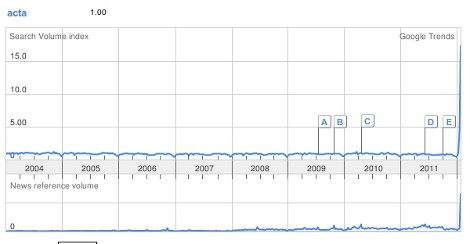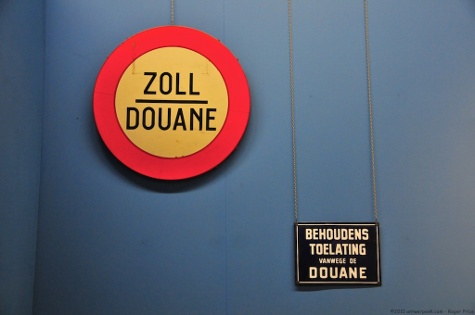On January 10, 2013, the Council of the Europeran Union has published Document 5129/13 titled Proposal for a regulation of the European Parliament and of the Council concerning customs enforcement of intellectual property rights.
This Draft Regulation sets out the conditions and procedures for action by the customs authorities where goods suspected of infringing an intellectual property right are, or should have been, according to Council Regulation (EEC) No 2913/92 establishing the Community Customs Code, subject to customs supervision or customs control within the customs territory of the Union, particularly goods in the following situations:
(a) when declared for release for free circulation, export or re-export in accordance with Articles 79 to 83, 161 to 162 and 182 of Regulation (EEC) No 2913/92;
(b) when entering or leaving the customs territory of the Union in accordance with Articles 37, 38 and 183 of Regulation (EEC) No 2913/92;
(c) when placed under a suspensive procedure or in a free zone or free warehouse in accordance with Articles 84, paragraph 1 a), and 166 of Regulation (EEC) No 2913/92.
The Council of the European Union had requested, in its Resolution of 25 September 2008 on a comprehensive European anti-counterfeiting and anti-piracy plan, that Council Regulation (EC) No 1383/2003 of 22 July 2003 concerning customs action against goods suspected of infringing certain intellectual property rights and the measures to be taken against goods found to have infringed such rights, be reviewed. The text now available with Document 5129/13 represents a milestone after some time of secret deliberations; see my earlier postings here, here, and there.
The present text of the Draft Regulation appears not to provide provisions especially aiming at digital goods in general or concerning the Internet. Maybe the EU Member states have learnt their lessons from the ACTA debacle.
(Pictogram: This image is from the AIGA symbol signs collection via Wikimedia Commons.)
As should be well known to everyone working on patents, copyright, trade marks and the like, the Anti-Counterfeiting Trade Agreement (ACTA) is a plurilateral agreement for the purpose of establishing international standards for intellectual property rights enforcement. In an earlier post on this blog I had reported in October last year on preparations for signing and ratification of ACTA in the EU, predicting that an epic battle on the ratification of ACTA is looming. Meanwhile, the Agreement has been signed on behalf of 31 Member States and on behalf of the EU as well.
It is absolutely safe to state that the public debate on ACTA has not calmed down. To the contrary, tensions are soaring as demonstrated by the Google Trends graph shown above: Just in these weeks and days the public interest in ACTA related matters as perceived by Google search engine has increased dramatically; look at the leading slope near the right-hand border of the plot. Fueled by real or imaginative parallels to the SOPA and PIPA Bills recently stalled in the U.S., broader circles of those parts of the general public engaged in Internet politics had a closer look into the ACTA matter, and many were not amused. Twitter timelines are buzzing with statements of discontent concerning ACTA; in Germany, protest demonstrations are scheduled to happen on February 11, 2012. In Poland, protest demonstrations with tens of thousands of participants have already been reported during past days (see also another video here).On January 26, Mr Kader Arif, the rapporteu for ACTA in the respective Committee of the European Parliament, stepped down, dismissing the entire political process of the creation of ACTA as follows:
“I condemn the whole process which led to the signature of this agreement: no consultation of the civil society, lack of transparency since the beginning of negotiations, repeated delays of the signature of the text without any explanation given, reject of Parliament’s recommendations as given in several resolutions of our assembly.”
As ACTA is considered to be a Mixed Agreement interfering with EU competences as well as with national ones it needs ratification not only by the EU Parliament on behalf of the European Union but also of each one of the 27 national Parliaments on behalf of each one of the EU Member States. Hence, starting later this year, we shall be entertained by watching a sort of a round dance of a political ratification theatre on a total of 28 stages including the European Parliament. And in many, if not in all EU Member States, a strong opposition will take the chance to push for a general debate on IP politics.
In some of the EU Member States the ACTA dispute may assist the respective national branch of the Pirate Party to enter the Parliament. Current polls on federal level say that the German branch of the Pirate Party may expect around 5% share of the votes for the lower chamber of the German Parliament (“Bundestag”). A broad grassroots movement fueld by protest against ACTA could well help them pass the 5% quorum hurdle. In view of the perceivable decay of the Liberal Democratic Party (“Freie Demokratische Partei”, FDP) which hangs around 3%, the German Piratenpartei might not only see chances to gain seats in the 2013 general elections but also to become junior coalition partner in a future German Government.
On May 30, 2011, the EU Council had published Document 10880/11 conveying a Proposal for a regulation of the European Parliament and of the Council concerning customs enforcement of intellectual property rights issued by the EU Commission under reference COM(2011) 285 final on May 26, 2011. The gist of this proposal was summarised within the Document as follows:
Continue reading »
In a reference for a preliminary ruling from the Rechtbank van eerste aanleg te Brussel (Belgium) to the Court of Justice of the European Union lodged on July 19, 2010 (Belgische Vereniging van Auteurs, Componisten en Uitgevers (Sabam) v Netlog NV, Case C-360/10), a legal question was posed as follows:
Do Directives 2001/29 ( 1 ) and 2004/48, ( 2 ) in conjunction with Directives 95/46, ( 3 ) 2000/31 ( 4 ) and 2002/58, ( 5 ) construed in particular in the light of Articles 8 and 10 of the European Convention on the Protection of Human Rights and Fundamental Freedoms, permit Member States to authorise a national court, before which substantive proceedings have been brought and on the basis merely of a statutory provision stating that: ‘They [the national courts] may also issue an injunction against intermediaries whose services are used by a third party to infringe a copyright or related right’, to order a hosting service provider to introduce, for all its customers, in abstracto and as a preventive measure, at its own cost and for an unlimited period, a system for filtering most of the information which is stored on its servers in order to identify on its servers electronic files containing musical, cinematographic or audio-visual work in respect of which SABAM claims to hold rights, and subsequently to block the exchange of such files?
This case throws a spotlight on a phenomenon which has become ubiquitous in the age of the Internet: When there is a case of wrongdoing related to the digital domain, stakeholders find that often it is inconvenient, sometimes even practically impossible to go for the primary wrongdoer because of difficulties to identify him or her or because of the wrongdoer is seated in a foreign jurisdiction which might be less than co-operative due to a variety of reasons. Cases based on some sort of infringement of IP rights and related to the digital domain are notorious for this kind of scenario.
So why not going for the intermediaries, which are plenty and inevitable necessary for running the Internet, some of them surely located in your own jurisdiction or at least in a foreign jurisdiction which shows a co-operative habit, many rights holders may ask themselves.
Continue reading »
Yesterday the EPO News channel reported on a “renewed commitment to cost-efficient European patents” by the EPO and the European Commission. As nobody really had the slightest doubts on the continued and strong support by the project’s two main driving forces, this “news” does not sound that confident and persuasive as it apparenty was intended.
I cannot help, but to me it sounds more like political PR language or even autosuggestion if the President of the EPO, Benoît Battistelli, and the European Commissioner for the Internal Market and Services, Michel Barnier, jointly confess that “the unitary patent is [...] expected to simplify procedures and lower the costs for applicants by up to 70%“.
On May 24, 2011, the EU Commission published Document COM(2011) 288 final (Available via EU Council under Document 10668/11) titled Proposal for a Regulation of the European Parliament and the Council on entrusting the Office for Harmonisation in the Internal Market (Trade Marks and Designs) with certain tasks related to the protection of intellectual property rights, including the assembling of public and private sector representatives as a European Observatory on Counterfeiting and Piracy. In the Commission Document, the background is described as follows:
One of the main initiatives to address this threat launched by the Council and the Commission in 2009 was to set up a European Observatory on Counterfeiting and Piracy to improve understanding on intellectual property rights (IPR) infringements (‘the Observatory’). In line with the Council’s request of 2008, the Observatory in its current form is a centre of expertise with no legal personality managed by the Commission services. Its role is twofold:
(i) becoming the central resource for gathering, monitoring and reporting information and data related to all IPR infringements and
(ii) be used as a platform for cooperation between representatives from national authorities and stakeholders to exchange ideas and expertise on best practices, to develop joint enforcement strategies and to make recommendations to policy-makers. The management of the Observatory encompasses a series of tasks and activities under the responsibility of Commission services.
The Observatory is currently run by three Commission civil servants (two administrators and one assistant) who, in addition also carry out all policy work related to the Observatory.
The latest Council Resolution relating to the Observatory added further responsibilities, by inviting it to assess the needs for implementation of EU-level training programmes for those involved in combating counterfeiting and piracy. A September 2010 European Parliament Resolution additionally called for the Observatory to compile scientific research data on counterfeiting and IPR regulation. Finally, a recently published study commissioned by the Commission’s Directorate General for Trade recommends that the Observatory should become a single point of contact within the Commission, for external parties, and an international point for the creation and dissemination of best practice.
Whereas the current circumstances of the Observatory were appropriate for the launch phase of the project, with its institutional framework being established through consultations and meetings, there is no scope for expanding the Observatory’s remit and developing its operational activities, both of which require a sustainable infrastructure in terms of human resources, financing and IT equipment as well as access to the necessary expertise.
Continue reading »
The k/s/n/h::law blog
Some of the patent attorneys of the KSNH law firm have joined their efforts to research what is going on in the various branches of IP law and practice in order to keep themselves, their clients as well as interested circles of the public up to date. This blog is intended to present results of such efforts to a wider public.
Blog Archives
- November 2013 (2)
- October 2013 (1)
- September 2013 (1)
- August 2013 (2)
- July 2013 (3)
- June 2013 (5)
- March 2013 (5)
- February 2013 (4)
- January 2013 (5)
- December 2012 (5)
- November 2012 (5)
- July 2012 (5)
- June 2012 (8)
- May 2012 (5)
- April 2012 (3)
- March 2012 (4)
- February 2012 (5)
- January 2012 (6)
- December 2011 (12)
- November 2011 (9)
- October 2011 (9)
- September 2011 (4)
- August 2011 (7)
- July 2011 (4)
- June 2011 (1)
Blog Categories
- business methods (6)
- EPC (7)
- EPO (12)
- EU law (92)
- ACTA (8)
- CJEU (4)
- Comitology (1)
- competition law (2)
- Enforcement (6)
- EU Unified Patent Court (62)
- FTA India (1)
- TFEU (2)
- Trade Marks (5)
- European Patent Law (37)
- German Patent ACt (PatG) (1)
- German patent law (5)
- Germany (6)
- Pirate Party (3)
- International Patent Law (4)
- PCT (2)
- IP politics (10)
- licenses (2)
- Litigation (5)
- Patentability (7)
- Patents (12)
- Piratenpartei (2)
- Software inventions (10)
- Uncategorized (9)
- Unitary Patent (24)
- US Patent Law (4)
Comments
- kelle on Germany: Copyright Protection More Easily Available For Works Of “Applied Arts”
- Time Limits & Deadlines in Draft UPCA RoP: Counting The Days - KSNH Law - Intangible.Me on Wiki Edition of Agreement on Unified Patent Court Agreement (UPCA)
- Time Limits & Deadlines in Draft UPCA RoP: Counting The Days | ksnh::law on Wiki Edition of Agreement on Unified Patent Court Agreement (UPCA)
- Wiki Edition of Agreement on Unified Patent Cou... on Wiki Edition of Agreement on Unified Patent Court Agreement (UPCA)
- European Commission Takes Next Step Towards Legalising Software Patents in Europe | Techrights on EU Commission publishes Proposal of amendend Brussels I Regulation for ensuring Enforcement of UPC Judgements
Blogroll
- 12:01 Tuesday
- America-Israel Patent Law
- Anticipate This!
- AwakenIP
- BlawgIT
- BLOG@IPJUR.COM
- BP/G Radio Intellectual Property Podcast
- Broken Symmetry
- Class 46
- Director's Forum: David Kappos' Public Blog
- Gray on Claims
- I/P UPDATES
- IAM Magazine Blog
- Intellectual Property Intelligence Blog
- IP Asset Maximizer Blog
- IP CloseUp
- IP Dragon
- IP Watch
- IP Watchdog
- IPBIZ
- ipeg
- IPKat
- ITC 337 Law Blog
- Just a Patent Examiner
- K's Law
- MISSION INTANGIBLE
- Patent Baristas
- Patent Circle
- Patent Docs
- Patently Rubbish
- PatentlyO
- Patents Post-Grant
- Reexamination Alert
- SPICY IP
- Tangible IP
- The 271 Patent Blog
- The Intangible Economy
- THE INVENT BLOG®
- Think IP Strategy
- Tufty the Cat
- Visae Patentes
The KSNH blogging landscape


This blog and the German-language sister blog k/s/n/h::jur link to the two popular and privately run blogs IPJur und VisaePatentes and continue their work and mission with a widened scope and under the aegis of our IP law firm.
ksnhlaw on Twitter
- No public Twitter messages.
 KSNH::JUR Feed (german)
KSNH::JUR Feed (german)- Ist Verschlüsselung passé? September 6, 2013Auf verschiedenen Feldern beruflicher Praxis ist dafür zu sorgen, dass Kommunikation vertraulich bleibt. Die trifft beispielsweise für Ärzte zu, aber auch für Anwälte, darunter auch Patentanwälte. Einer der zahlreichen Aspekte, die in diesem Zusammenhang eine Rolle spielen, ist die Technik, um die Vertraulichkeit beruflicher Kommunikation sicherzustellen. Wa […]
- EU-Einheitspatent: Demonstrativer Optimismus und Zahlenmystik allerorten – Naivität oder politische Beeinflussung? June 26, 2013Nach mehreren vergeblichen Anläufen zur Schaffung eines EU-weiten Patentsystems wurde 1973 als Kompromiss das Europäische Patentübereinkommen unterzeichnet, welches unabhängig von der seinerzeit noch EWG genannten Europäischen Union System zur zentralisierten Patenterteilung mit nachgeordnetem Einspruchsverfahren durch das Europäische Patentamt schuf. Wie wi […]
- Moderne Zeiten oder: DPMA und Patentgericht streiten über die elektronische Akte April 25, 2013Bekanntlich hat das Deutsche Patent- und Markenamt (DPMA) im Jahre 2013 mit der rein technischen Fertigstellung der Einrichtungen zur elektronischen Akteneinsicht einen wichtigen Meilenstein seines Überganges von der Papierakte zur “elektronischen Akte” erreicht. Im DPMA werden aber bereits seit dem 01. Juni 2011 Patente, Gebrauchsmuster, Topografien und erg […]
- Gutachten zu Forschung, Innovation und technologischer Leistungsfähigkeit Deutschlands 2013 March 11, 2013Unter dem Datum vom 28. Februar 2013 ist die Bundestags-Drucksache 17/12611 veröffentlicht worden Sie trägt den Titel Unterrichtung durch die Bundesregierung - Gutachten zu Forschung, Innovation und technologischer Leistungsfähigkeit Deutschlands 2013. Die Bundesregierung legt dem Deutschen Bundestag seit dem Jahr 2008 […]
- 3D-Printing: Zum Filesharing von 3D-Modelldaten February 25, 2013In meiner kleinen zuvor angekündigten Reihe über rechtliche Aspekte des 3D Printing komme ich heute auf die Frage zu sprechen, ob die Hersteller von Gerätschaften es hinnehmen müssen, wenn Ersatztreile davon – vom Brillengestell über Smartphone-Gehäuseteile bis hin zu Rastenmähermotor-Abdeckungen – gescannt und die daraus […]
- Ist Verschlüsselung passé? September 6, 2013








